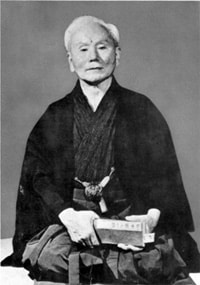Gichin Funakoshi, born on November 10 1868 and died on April 26 1957, was a pioneer and visionary of modern karate. Nicknamed the “father of modern karate”, he is widely credited with introducing and popularizing this fighting style on Japanese soil.
Funakoshi was born in the town of Shuri, in the ancient kingdom of Ryukyu, now known as Okinawa Prefecture, Japan. Born into a lower-class samurai family, he was introduced to the martial arts at an early age. It is said that he began studying karate at the age of 11 with Yasutsune Azato, a friend of his father’s and a respected karate master.
For many years, Funakoshi was a diligent student of Azato, learning and mastering the art of karate. He was trained in secrecy, mainly at night, due to the ban on martial arts at the time. Funakoshi later studied with another influential master, Yasutsune Itosu. He combined the techniques and philosophies of his two masters to develop his own style of karate.

Funakoshi was a dedicated student, who not only studied the physical aspects of karate, but also embraced its philosophy and principles. He always advocated karate as a means of improving health, developing character and learning self-discipline. His philosophy was based on the idea that the ultimate goal of karate was not victory or defeat, but the perfecting of the character of its practitioners.
In 1922, Funakoshi was invited to Tokyo to present karate at a national martial arts event. This demonstration had a significant impact, leading to the foundation of the first karate dojo on Japanese soil, the “Shotokan”. Funakoshi’s style of karate, known as Shotokan, was characterized by linear movements and strong stances.
Funakoshi devoted the rest of his life to teaching karate, focusing not only on techniques, but also on the importance of ethics and philosophy. He also worked to create formal structures for the teaching of karate, including the creation of the Japan Karate Association in 1949.
As a teacher, Funakoshi was known for his strictness, but also for his kindness and generosity. He instilled in his students a deep understanding of the spirit of karate, stressing the importance of discipline, respect and humility.
Gichin Funakoshi died in 1957 at the age of 88. His life and legacy have left an indelible
lasting impact on the history of karate. He not only introduced karate to Japan, but was also an important catalyst for its international recognition.
Today, Funakoshi’s Shotokan karate is practiced all over the world. His influence can be seen not only in Shotokan techniques and kata, but also in the philosophy and principles underlying modern karate. Funakoshi’s writings, including his “Twenty Precepts of Karate”, remain a source of inspiration for karate practitioners the world over.
Funakoshi left behind a legacy that continues to inspire millions of people around the world. He made karate more than just a martial art, turning it into a path of personal development and growth. His dedication to teaching, his wisdom and his philosophy make him an emblematic figure in karate.
In short, Gichin Funakoshi was a pioneer of modern karate, a dedicated educator and a passionate practitioner. He left an indelible mark on the history of the martial arts, not only by introducing karate to Japan, but also by defining the philosophy and principles underlying this martial art. His legacy continues to inspire generations of karate practitioners around the world.


